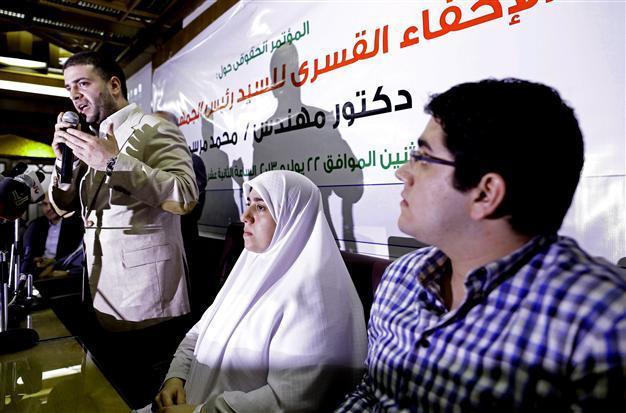Morsi’s fugitive son arrested to be jailed for drug use
CAIRO - Agence France-Presse

n Monday, July 22, 2013 this file photo, Osama Morsi, left, Shaimaa, center, and Abdullah, right, children of ousted Egyptian President Mohammed Morsi attend a press conference in Cairo, Egypt. AFP Photo
A son of ousted Egyptian President Mohamed Morsi, who was sentenced to a year in prison for possession and use of hashish, was arrested early July 18 at a train station south of Cairo, security officials said.Abdullah Morsi, 19, who security officials said was on the run, was arrested while boarding a train heading to Upper Egypt. His arrest was also reported by the official MENA news agency.
An Egyptian court on July 2 had sentenced him and one of his friends to a year in prison.
The two were initially arrested on March 1 after allegedly being found in possession of two hashish joints while they were in a car parked by the roadside in Qalyubia province, north of Cairo.
But they were freed the next day pending investigation after agreeing to give urine samples, which the prosecution said tested positive.
A court in Banha, in the Nile Delta province of Qalyubia north of Cairo, handed down sentences of one year in jail and fines of 10,000 Egyptian pounds (around $1,400 or 1,025 euros) each.
Abdullah Morsi was not present when the court delivered the verdict, which can be appealed.
Defense lawyer Mohamed Abu Leila said at the time that the case “was fabricated,” while Morsi’s other son, Osama Morsi, told AFP that the case against his brother was an attempt to defame his family.
Since Morsi was ousted by the army on July 3, 2013, the authorities have been accused of using the judiciary as a tool of repression.
Morsi himself and several leaders from his Muslim Brotherhood have been put on trial on charges that could lead to the death penalty.
A police crackdown targeting his supporters has sparked street clashes in which more than 1,400 people have died.
More than 15,000 others have been jailed with around 200 sentenced to death in speedy mass trials that have sparked an international outcry.
















